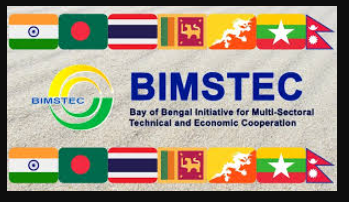Bay of Bengal Initiative for Multi-Sectoral Technical and Economic Cooperation (BIMSTEC)
The Bay of Bengal Initiative for Multi-Sectoral Technical and Economic Cooperation (BIMSTEC) is a regional organization comprising seven Member States lying in the littoral and adjacent areas of the Bay of Bengal constituting a contiguous regional unity. This sub-regional organization came into existence on 6 June 1997 through the Bangkok Declaration.
Member States
The Member States of BIMSTEC are:
- Bangladesh
- Bhutan
- India
- Myanmar
- Nepal
- Sri Lanka
- Thailand
These seven Member States represent a population of approximately 1.73 billion people, which constitutes around 22% of the global population. The combined Gross Domestic Product (GDP) of these nations is estimated at over $3.697 trillion.
Objectives
The main objective of BIMSTEC is to promote economic cooperation and integration among the Member States. It aims to create an enabling environment for rapid economic development through the identification and implementation of specific cooperation projects in various sectors.
The organisation also seeks to accelerate social progress in the sub-region, promote active collaboration and mutual assistance on matters of common interest, and provide assistance to each other in the form of training and research facilities.
Areas of Cooperation
BIMSTEC has identified 14 priority sectors for cooperation:
- Trade and Investment
- Transport and Communication
- Energy
- Tourism
- Technology
- Fisheries
- Agriculture
- Public Health
- Poverty Alleviation
- Counter-Terrorism and Transnational Crime
- Environment and Natural Disaster Management
- People-to-People Contact
- Cultural Cooperation
- Climate Change
Each of these sectors is led by one or more Member States. India is the lead country for Transport and Communication, Tourism, Environment and Natural Disaster Management, and Counter-Terrorism and Transnational Crime.
Achievements
Since its inception, BIMSTEC has made some progress in regional cooperation. Some of its key achievements include:
- The establishment of the BIMSTEC Free Trade Area Framework Agreement in 2004.
- The signing of the BIMSTEC Convention on Cooperation in Combating International Terrorism, Transnational Organized Crime and Illicit Drug Trafficking in 2009.
- The adoption of the BIMSTEC Transport Infrastructure and Logistics Study in 2014.
- The establishment of the BIMSTEC Energy Centre in Bengaluru, India, in 2017.
- The signing of the BIMSTEC Grid Interconnection MoU in 2018 to enhance energy cooperation among Member States.
Issues
Despite its progress, BIMSTEC faces several challenges. The organization has been criticized for its slow pace of progress and the lack of a dedicated secretariat. The Member States also have varying levels of economic development, which can make cooperation difficult.
Additionally, political instability and security issues in some Member States have hindered the organization’s progress. The Rohingya refugee crisis in Myanmar and the political turmoil in Thailand have posed significant challenges to regional cooperation.
BIMSTEC has the potential to become a significant player in regional cooperation and integration. With its focus on multi-sectoral cooperation and its strategic location, the organization can play a crucial role in promoting economic growth and development in the region. However, it must overcome the challenges it faces and work towards strengthening its institutional framework to achieve its objectives.


